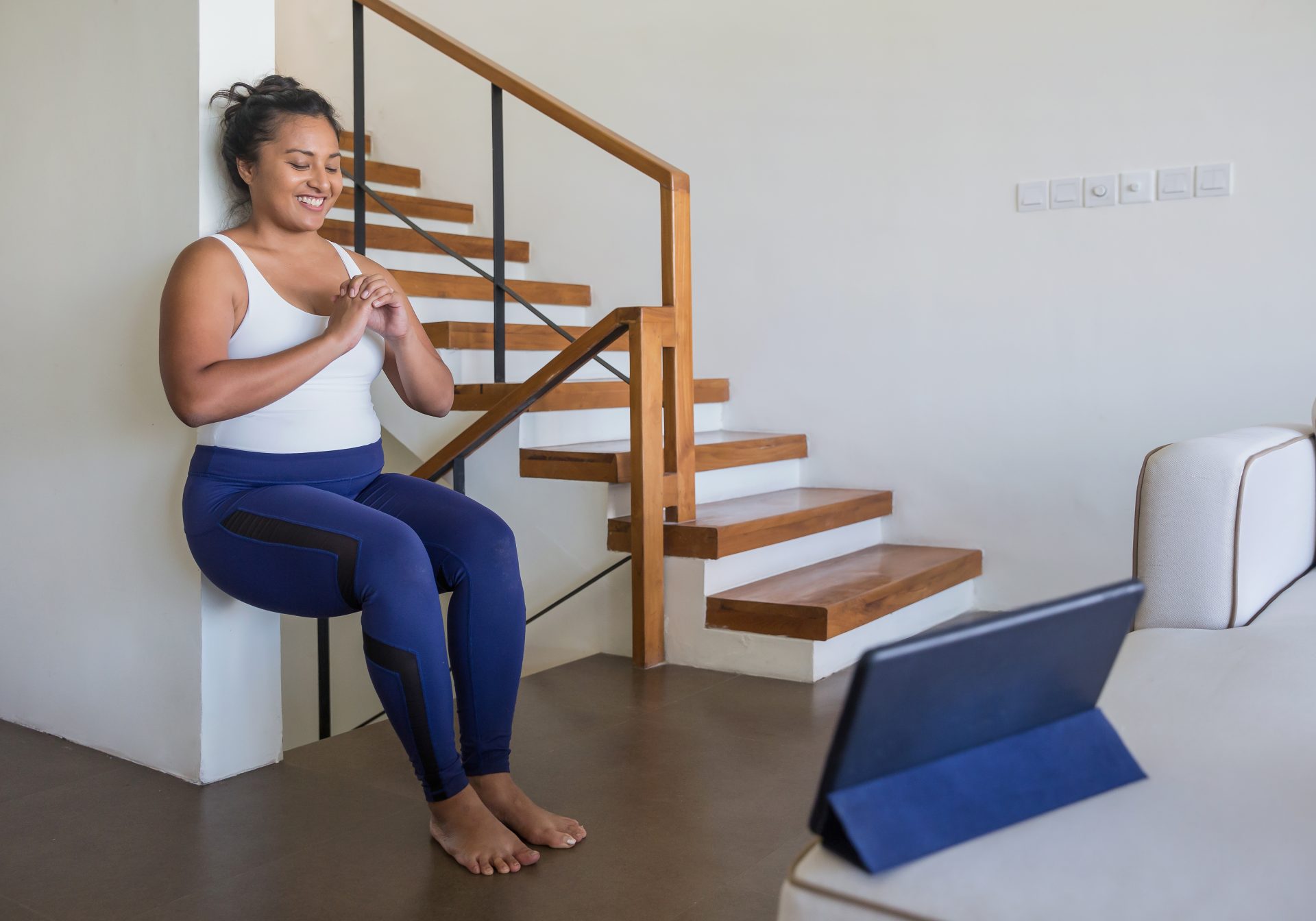Workouts are going vertical and in this heat, there’s no better way to squeeze in a zero-equipment sweat session than by using what’s around us in the great outdoors.
We may have spent the last 14 months trying to escape them but believe us when we say that using a wall in your workout routine could be the key to getting fit with zero equipment. Whether you need to squeeze in a quick sweat session at lunch or just want to perfect your form for certain bodyweight moves, walls can provide both support and variety to routines.
“The wall is a great way to help assist support while doing exercise,” Jo-Leigh Morris, personal trainer at BXR, tells Stylist. “It can give more confidence and support to beginners or anyone recovering from injuries and is a perfect way to align the spine and correct posture as well as help with stability and strengthening muscle imbalances.”
You may also like
Stability ball exercises: 3 workouts to improve your strength and balance
If you think that relying on a wall makes exercises easier, think again. Deanna Brash, performance specialist at Bodyism, says that while it can act as a useful stabiliser, it can also take our workouts to the next level.
“The wonder of incorporating a wall into your workout is that it can make some exercises easier and others more difficult,” she explains. “It can challenge balance, working the core and the stabiliser muscles around your hips, knees and shoulders. Certain wall exercises can help to build better proprioception (how we understand the position and movement of our body), reducing the risk of injury and preventing larger muscles from over-compensating as well.”
Brash warns that you just need to make sure that your chosen wall is free from screws and has plenty of clear space around it. Oh, and she suggests thinking carefully about what you wear on your feet: “I would recommend bare feet or grippy socks but not ordinary socks as you’ll slip and could cause injury.”
5 wall exercises to try
Wall press-up
“This is to strengthen the upper body but mainly the chest,” Morris says. “Press-ups can be tough but by starting on the wall, it’s a great way to check form and precision and very helpful for anyone new to training.”
2 sets, 20 reps (or as many as you can)
- Start by standing about one stride away from the wall.
- Place the hands on the wall, positioning them slightly wider than the shoulders.
- With your feet hip-width apart, heels elevated and core engaged, bend the elbows making 45° angles, going as low as possible to hit full range of motion.
- Straighten the arms to lift back into your plank position.
Marching Bridges
“This will really work your glutes, hamstrings, core and transverse abdominals (deep core muscles), so it’s a great lower body workout,” explains Brash.
2 sets, 15 reps each leg
- Lie on your back with your sit bones facing the wall, your feet flat against the wall, and your knees above your hips.
- Curl the tailbone off the mat while pressing the feet into the wall to form an elevated bridge position.
- Gently take one foot off at a time, marching the feet.
- Keep the pelvis stable and ensure there is no movement in the rest of the body.
- Gently lower down.

Wall Sit
“This is essentially an assisted squat,” says Morris. “It’s an amazing way to correct a lot of bad squatting habits such as keeping the knees in the correct placement. It also helps us to avoid tucking the pelvis under while supporting the lower spine as well as fully isolating into the glutes.”
2 sets, hold for 30 seconds each set
- Start by standing against the wall.
- Take a step forward, keeping the spine and head on the wall.
- With your arms down by the sides, bend the knees to make a 90° angle and reach the arms forward. Hold here.
- You should now be “sitting” against the wall.
- For an extra challenge, try to lift one leg out, then repeat the other side.
Mountain Climbers
Although a wall is predominantly for resistance training, it can also be great for cardio workouts. This will work your core, shoulders, triceps, hip flexors and stabilisers around the hips and shoulders.
45 seconds or 10 reps on each leg
- Start in an elevated plank position by placing your hands on the floor with your elbows extended and feet on the wall at head height.
- Engage the upper body by pushing the floor away with your hands to encourage strength in the position.
- Slowly draw one knee into the chest, return the foot to the wall then draw the other knee into the chest. Repeat for 45 seconds.
Handstand Pike
“This is an upper-body focused exercise, strengthening the shoulders, chest, back, bicep, triceps and core,” Morris tells us.
Hold 30 seconds
- Start by kneeling on the floor, facing the wall about a foot away.
- Place both hands onto the floor and place one foot at a time up onto the wall.
- Make sure that your hands are under your shoulders to make your body into an upside-down “L” shape.
- Hold this position for 30 seconds before gently lowering down.
Looking for more bodyweight, zero-equipment workouts? Check out Mia’s bodyweight video series now.
Images: Getty
Source: Read Full Article
